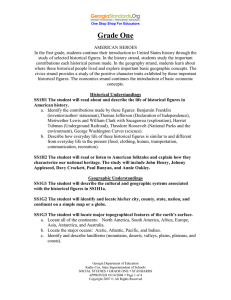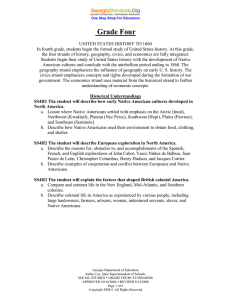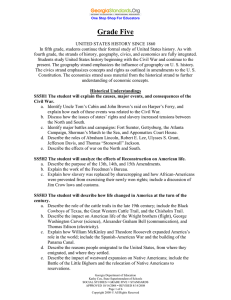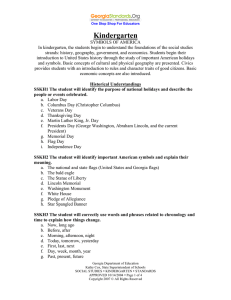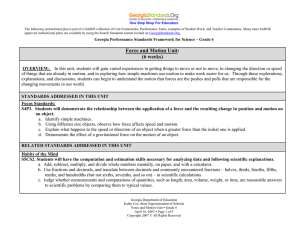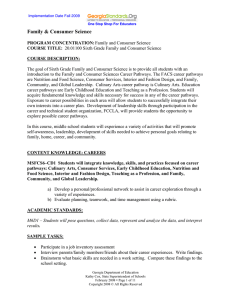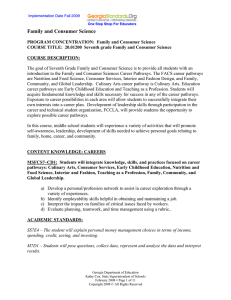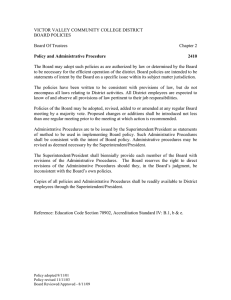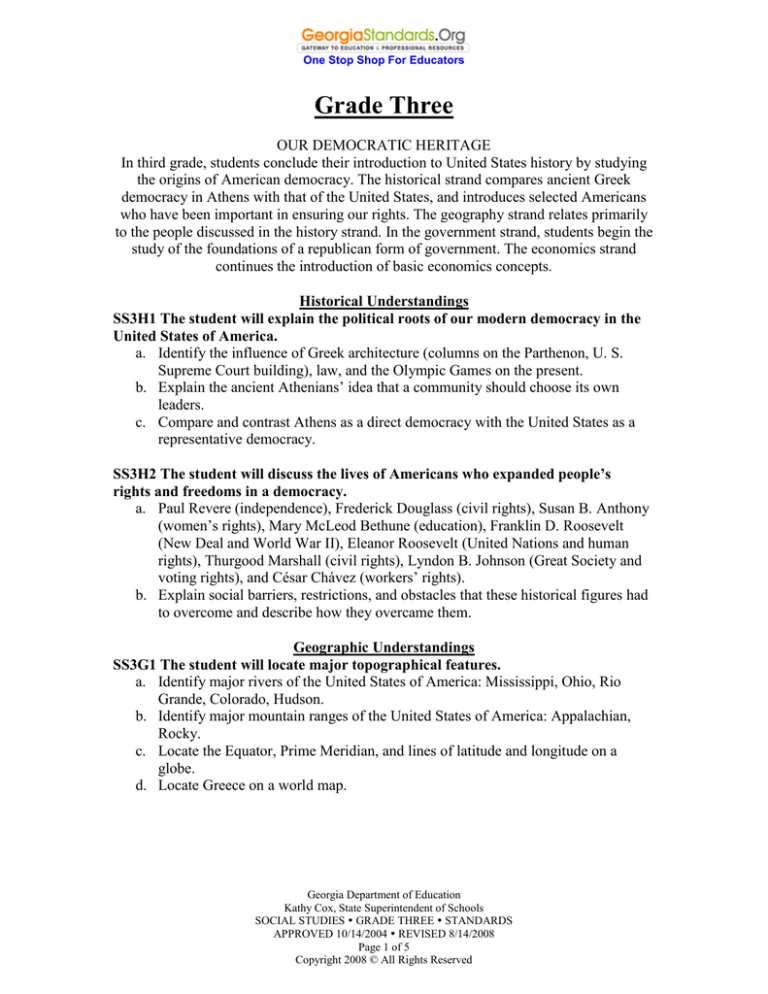
One Stop Shop For Educators
Grade Three
OUR DEMOCRATIC HERITAGE
In third grade, students conclude their introduction to United States history by studying
the origins of American democracy. The historical strand compares ancient Greek
democracy in Athens with that of the United States, and introduces selected Americans
who have been important in ensuring our rights. The geography strand relates primarily
to the people discussed in the history strand. In the government strand, students begin the
study of the foundations of a republican form of government. The economics strand
continues the introduction of basic economics concepts.
Historical Understandings
SS3H1 The student will explain the political roots of our modern democracy in the
United States of America.
a. Identify the influence of Greek architecture (columns on the Parthenon, U. S.
Supreme Court building), law, and the Olympic Games on the present.
b. Explain the ancient Athenians’ idea that a community should choose its own
leaders.
c. Compare and contrast Athens as a direct democracy with the United States as a
representative democracy.
SS3H2 The student will discuss the lives of Americans who expanded people’s
rights and freedoms in a democracy.
a. Paul Revere (independence), Frederick Douglass (civil rights), Susan B. Anthony
(women’s rights), Mary McLeod Bethune (education), Franklin D. Roosevelt
(New Deal and World War II), Eleanor Roosevelt (United Nations and human
rights), Thurgood Marshall (civil rights), Lyndon B. Johnson (Great Society and
voting rights), and César Chávez (workers’ rights).
b. Explain social barriers, restrictions, and obstacles that these historical figures had
to overcome and describe how they overcame them.
Geographic Understandings
SS3G1 The student will locate major topographical features.
a. Identify major rivers of the United States of America: Mississippi, Ohio, Rio
Grande, Colorado, Hudson.
b. Identify major mountain ranges of the United States of America: Appalachian,
Rocky.
c. Locate the Equator, Prime Meridian, and lines of latitude and longitude on a
globe.
d. Locate Greece on a world map.
Georgia Department of Education
Kathy Cox, State Superintendent of Schools
SOCIAL STUDIES GRADE THREE STANDARDS
APPROVED 10/14/2004 REVISED 8/14/2008
Page 1 of 5
Copyright 2008 © All Rights Reserved
One Stop Shop For Educators
SS3G2 The student will describe the cultural and geographic systems associated
with the historical figures in SS3H2a.
a. Identify on a political map specific locations significant to the life and times of
these historical figures.
b. Describe how place (physical and human characteristics) had an impact on the
lives of these historical figures.
c. Describe how each of these historical figures adapted to and was influenced by
his/her environment.
d. Trace examples of travel and movement of these historical figures and their ideas
across time.
e. Describe how the regions in which these historical figures lived affected their
lives and had an impact on their cultural identification.
Government/Civic Understandings
SS3CG1 The student will explain the importance of the basic principles that provide
the foundation of a republican form of government.
a. Explain why in the United States there is a separation of power between branches
of government and levels of government.
b. Name the three levels of government (national, state, local) and the three branches
in each (executive, legislative, judicial), including the names of the legislative
branch (Congress, General Assembly, county commission or city council).
c. State an example of the responsibilities of each level and branch of government.
SS3CG2 The student will discuss the character of different historical figures in
SS3H2a.
a. Describe how the different historical figures in SS3H2a display positive character
traits of cooperation, diligence, courage, and leadership.
b. Explain how the historical figures in SS3H2a used positive character traits to
support their beliefs in liberty, justice, tolerance, and freedom of conscience and
expression.
c. Explain how the historical figures in SS3H2a chose when to respect and accept
authority.
Economic Understandings
SS3E1 The student will describe the four types of productive resources:
a. Natural (land)
b. Human (labor)
c. Capital (capital goods)
d. Entrepreneurship (used to create goods and services)
SS3E2 The student will explain that governments provide certain types of goods
and services in a market economy, and pay for these through taxes and will describe
services such as schools, libraries, roads, police/fire protection, and military.
Georgia Department of Education
Kathy Cox, State Superintendent of Schools
SOCIAL STUDIES GRADE THREE STANDARDS
APPROVED 10/14/2004 REVISED 8/14/2008
Page 2 of 5
Copyright 2008 © All Rights Reserved
One Stop Shop For Educators
SS3E3 The student will give examples of interdependence and trade and will
explain how voluntary exchange benefits both parties.
a. Describe the interdependence of consumers and producers of goods and services.
b. Describe how goods and services are allocated by price in the marketplace.
c. Explain that some things are made locally, some elsewhere in the country, and
some in other countries.
d. Explain that most countries create their own currency for use as money.
SS3E4 The student will describe the costs and benefits of personal spending and
saving choices.
Georgia Department of Education
Kathy Cox, State Superintendent of Schools
SOCIAL STUDIES GRADE THREE STANDARDS
APPROVED 10/14/2004 REVISED 8/14/2008
Page 3 of 5
Copyright 2008 © All Rights Reserved
One Stop Shop For Educators
Social Studies Skills Matrices
MAP AND GLOBE SKILLS
GOAL: The student will use maps to retrieve social studies information.
I: indicates when a skill is introduced in the standards and elements as part of the content
D: indicates grade levels where the teacher must develop that skill using the appropriate content
M: indicates grade level by which student should achieve mastery, the ability to use the skill in all
situations
A: indicates grade levels where students will continue to apply and improve mastered skills
Map and Globe Skills
K 1
1. use cardinal directions
I
2. use intermediate directions
3. use a letter/number grid system to
determine location
4. compare and contrast the categories of
natural, cultural, and political features
found on maps
5. use inch to inch map scale to determine
distance on map
6. use map key/legend to acquire
information from, historical, physical,
political, resource, product and economic
maps
7. use a map to explain impact of
geography on historical and current events
8. draw conclusions and make
generalizations based on information from
maps
9. use latitude and longitude to determine
location
10. use graphic scales to determine
distances on a map
11. compare maps of the same place at
different points in time and from different
perspectives to determine changes,
identify trends, and generalize about
human activities
12. compare maps with data sets (charts,
tables, graphs) and /or readings to draw
conclusions and make generalizations
3
4
5
6
M A
A
A
A
A A
A A
M A
A
A
A A
A A
I
M A
A
A A
A A
I
M A
A
A A
A A
I
M A
A
A A
A A
I
D
M A
A A
A A
I
D
M A
A A
A A
I
M A
A A
A A
I
D
D
D M A A
I
M A A
A A
I
M A A
A A
I
M A A
A A
I
Georgia Department of Education
Kathy Cox, State Superintendent of Schools
SOCIAL STUDIES GRADE THREE STANDARDS
APPROVED 10/14/2004 REVISED 8/14/2008
Page 4 of 5
Copyright 2008 © All Rights Reserved
7
8
912
2
One Stop Shop For Educators
INFORMATION PROCESSING SKILLS
GOAL: The student will be able to locate, analyze, and synthesize information related to
social studies topics and apply this information to solve problems/make decisions.
I: indicates when a skill is introduced in the standards and elements as part of the content
D: indicates grade levels where the teacher must develop that skill using the appropriate content
M: indicates grade level by which student should achieve mastery, the ability to use
the skill in all situations
A: indicates grade levels where students will continue to apply and improve mastered skills
Georgia Department of Education
Kathy Cox, State Superintendent of Schools
SOCIAL STUDIES GRADE THREE STANDARDS
APPROVED 10/14/2004 REVISED 8/14/2008
Page 5 of 5
Copyright 2008 © All Rights Reserved

